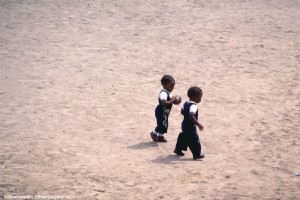Òwe Yorùbá ní “Àjùmòbí kò kan tãnu, ẹni Olúwa bá rán síni ló nṣeni lõre”. Òwe yi wúlò lati gba àwọn ènìà tí o gbójúlé ẹbí níyànjú. Ọ̀pọ̀lọpọ̀ rò wípé ẹ̀tọ́ ni ki ẹni tí ó bá lówó nínú ẹbí tàbí tí ó ngbe ni Òkè-Òkun bá wọn gbé ẹrù lai ro wípé ẹbí tí o lówó tàbí gbé l’Ókè-Òkun ní ẹrù tiwọn lati gbé.
Yorùbá ní “Òṣìṣẹ́ wa lõrun, abáni náwó wà níbòji”, ọ̀pọ̀lọpọ̀ agbójúlẹ́bí wọnyi, ma mba ẹni tí o nṣiṣẹ ka owó lai rò wípé ẹni tí ó nṣiṣẹ yi, nlãgun lati rí owó. Iṣẹ́ lẹ́ni tí ó wa l’Ókè-Òkun/Ìlú-Òyìnbó nṣe nínú òtútù. Fún àpẹrẹ: níbití olówó tàbí àwọn tí ó ngbe Òkè-òkun tí nṣe àwọn nkan níwọnba bí – ọmọ bíbí, aṣo rírà, ẹ̀rọ ìbánisọ̀rọ̀, àti bẹ̃bẹ lọ, ọ̀pọ̀lọpọ̀ agbójúlẹ́bí á bímọ rẹpẹtẹ, kó owó lé aṣọ, bèrè ẹ̀rọ ìbánisọ̀rọ̀ olówó nla tí ẹni tí ó wà l’Ókè-Òkun ó lè kó owó lé lórí àti gbogbo àṣejù míràn.
Ẹbí olówó tàbí tí ó ngbe Òkè-òkun kò lè dípò Ìjọba. Ọ̀dọ̀ Ìjọba tí ó ngba owó orí lóyẹ kí á ti bèrè ẹ̀tọ́, ki ṣe lọ́wọ́ ẹbí. Ẹbí tóní owó tàbí gbé Òkè-òkun lè fi ojú ãnu ṣe ìrànlọ́wọ́, ṣùgbọ́n ki ṣe iṣẹ́ ẹni bẹ̃ lati gbé ẹrù ẹlẹ́rù. Ẹjẹ́ ká rántí òwe yi wípé “Àjùmọ̀bí kò kan tãnu, ẹni Olúwa bá rán síni ló nṣeni lõre”, nítorí aladugbo, àjòjì, ọ̀rẹ́, àti bẹ̃bẹ lọ, lè ṣeni lãnu bí Olúwa bá rán wọn.
ENGLISH TRANSLATION
A Yoruba saying goes that “same parentage does not compel compassion, only those sent by God show compassion”. This proverb can be used to advice those dependent on family member. Many dependents think it is a right for rich or family members living abroad to carry their responsibilities.
“The worker is in the sun, while the spender is in the shade”, many dependents are fond of counting the earnings of their rich family members or those living in diaspora without counting the sweat that goes into earning money. People living diaspora have to work hard and long hours (sometimes in the cold) to earn a living. Thus, while many that are perceived to be rich or living abroad are prioritizing the number of children per family, reducing expenses on clothing, expensive mobile phones etc., many of their dependents do the opposite by giving birth to many children, spending much on clothes, demanding for expensive mobile phones that those living abroad have not acquired and so on.
Sadly, the rich family member or those living in diaspora are not an adequate or appropriate substitute for government/tax payer funded social security. It might be appropriate to demand benefits from the Government that collects taxes from the people. The rich or those living in diaspora can only help on compassionate ground but not as a matter of responsibility. Let us remember the proverb that “same parentage does not compel compassion, only those sent by God show compassion”, because, neighbours, strangers, friends, etc. can show compassion if sent by God.
Originally posted 2014-11-18 18:00:26. Republished by Blog Post Promoter




Thanks in a million for your reflection about compassion and empathy. The Bible expressed the love of our neighbor, this includes our relations : next of kins, and our immediate sisters or brothers. Human beings are very cynical, since we think of the love from our brothers or sisters as superior and desirable. We may share the same gens, which we understand as super or perfect, but we should remember the external factors, such as the maturational developmental process. Human personality is a subject of our developmentalization: Your blood Brother/Sister could be your supreme enemy, while a stranger could be the unexpected Angel in our lives. ” Omo iya ti aro wipe o wa ni Ibadan, nitori pe a ro wipe Yoruba ni, ki a ma se je ki oya wa lenu wipe Hausa ni Omo iya na”.